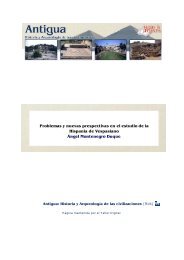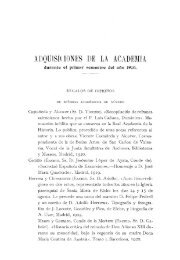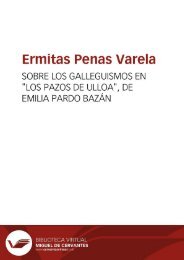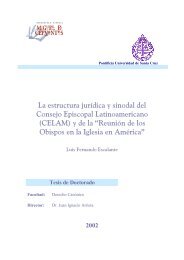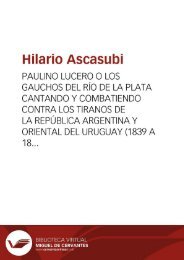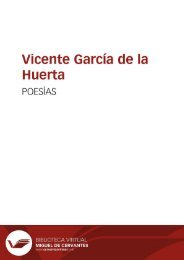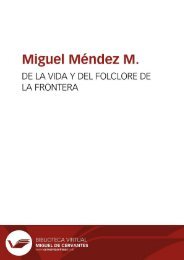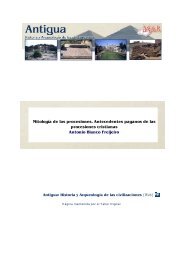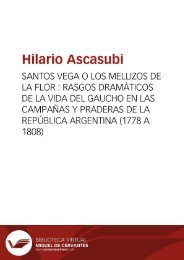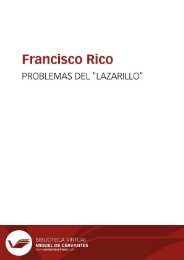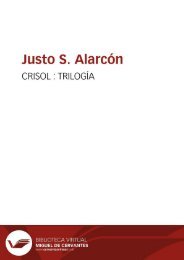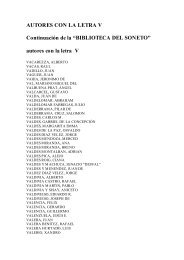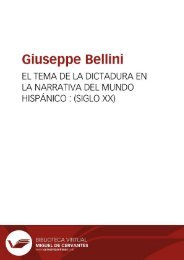Create successful ePaper yourself
Turn your PDF publications into a flip-book with our unique Google optimized e-Paper software.
Anales galdosianos [Publicaciones periódicas]. Año XII, 1977<br />
is subjected to the most merciless satire in this terrain 146 , and the effects of his emphatic phrases<br />
on Máximo are graphically portrayed: « sus huecos párrafos resonaban en mi espíritu con rumor<br />
semejante al de un cascarón de huevo vacío cuando se cae al suelo y se aplasta por sí solo » (XII,<br />
72). Manuel Peña's fustian speech in the theater is enough to assure his political and social future and<br />
catapults him into prominence, though even José María is impelled to comment: « ¡Lo que vale aquí<br />
la oratoria brillante y esa facultad española de decir cosas bonitas que no significan nada práctico!<br />
» (XXXI, 1891-90). As pervasive as political oratory is, poetry has not escaped the damaging touch<br />
of rhetoric either. <strong>Galdós</strong>' frequent derision of poets, from La Fontana de Oro on, for the sins they<br />
have visited upon the Spanish language is well known. In El amigo Manso , Francisco de Paula de<br />
la Costa y Sainz del Bardal, to whom Máximo refers as « Este tipo » (XII, 71), is the poetaster<br />
who thrives on a doting and tasteless moneyed class. From his name to his beard to his health to his<br />
character to his address to his talents as a versifier, this « caballerito ignorante » is unrelentingly<br />
caricaturized. The pompousness of his self-esteem is comparable only to that of his odes. 147<br />
The reflexive nature of El amigo Manso filters through this attention to the word to a consideration<br />
of literary styles. Manso knows that his brother's house is six minutes or 560 paces away from his,<br />
and he phrases his report about Doña Javiera thus: « un día se metió en mi casa (tercero derecha)<br />
sin anunciarse »; « cuando entraba en su casa (principal izquierda) » (III, 14, 15). Along with<br />
the ridicule these details heap on Manso's exaggerated sense of precision, they also show <strong>Galdós</strong><br />
laughing at his way as a novelist, at the realistic novel's insistence on exactitude in its descriptive<br />
technique. More frequently, however, it is the romantic style that the author of Marianela chooses<br />
to burlesque 148 . Time and again in his narration, Manso adopts romantic postures and language<br />
146 For his portrait and a snippet of his prose, see Ch. XXVI.<br />
147 One is reminded of Leopoldo Alas' several satirical incarnations of this literary type in his stories:<br />
Miguel Paleólogo Bustarnante in « Bustamante » ( Pipá [Madrid: Fernando Fe, 1886]; Don Tristán<br />
de las Catacumbas, the protagonist of « El poeta-buho »; Don Ermeguncio de la Trascendencia in<br />
« Don Ermeguncio o la vocación »; Don Teopompo Filoteo de Belem in « Versos de un loco »,<br />
whose calling card identifies him as a « Poeta esotérico ultratelúrico » (all in Doctor Sutilis [ Madrid:<br />
Renacimiento , 1916]).<br />
148 Nimetz (p. 14), like Casalduero before him, points out that <strong>Galdós</strong> frequently satirizes<br />
romanticism and romantic taste in the Novelas contemporáneas , but he does not mention El amigo<br />
Manso in this connection. The subject of <strong>Galdós</strong>' romantic parodies in his later career has provided<br />
108




